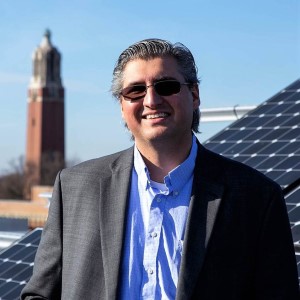Trends in Dynamic Modeling of Converter Dominated Power Systems
The trend in electric power systems is the displacement of traditional synchronous generation (e.g., coal, natural gas) with renewable energy resources (e.g., wind, solar photovoltaic) and battery energy storage. These energy resources require power electronic converters (PECs) to interconnect to the electric grid that have different dynamic responses compared to conventional synchronous generators. As a result, there is a need for validated models to study and mitigate PEC-based stability issues, especially for converter dominated power systems (e.g., island power systems, remote microgrids). This talk will provide a review of the existing PEC models focusing on data driven modeling approaches and how to leverage power hardware in-the-loop experiments to model PEC. The talk will conclude with open research questions in the area of modeling, simulation, and control of future converter dominated power systems.
Date and Time
Location
Hosts
Registration
-
 Add Event to Calendar
Add Event to Calendar
- Concordia University
- 1515 Sainte-Catherine O, Montréal, QC H3G 2W1
- Montreal, Quebec
- Canada H3G 2W1
- Building: EV building
- Room Number: EV.3.309
- Contact Event Hosts
-
Prof Ambrish Chandra, ÉTS
email: ambrish.chandra@etsmtl.ca
- Co-sponsored by PES/IES/IAS/PE IEEE Montreal Chapters
Speakers
 Dr. Reinaldo Tonkoski of Electrical and Computer Engineering Department at University of Maine - Orono
Dr. Reinaldo Tonkoski of Electrical and Computer Engineering Department at University of Maine - Orono
Trends in Dynamic Modeling of Converter Dominated Power Systems
The trend in electric power systems is the displacement of traditional synchronous generation (e.g., coal, natural gas) with renewable energy resources (e.g., wind, solar photovoltaic) and battery energy storage. These energy resources require power electronic converters (PECs) to interconnect to the electric grid that have different dynamic responses compared to conventional synchronous generators. As a result, there is a need for validated models to study and mitigate PEC-based stability issues, especially for converter dominated power systems (e.g., island power systems, remote microgrids). This talk will provide a review of the existing PEC models focusing on data driven modeling approaches and how to leverage power hardware in-the-loop experiments to model PEC. The talk will conclude with open research questions in the area of modeling, simulation, and control of future converter dominated power systems.
Biography:
Reinaldo Tonkoski (SMIEEE) is the Robert N. Haskell Power Professor in the Electrical and Computer Engineering Department at University of Maine - Orono. A 2011 PhD graduate from Concordia University, Dr. Tonkoski has authored over one hundred technical publications in peer reviewed journals and conferences and is currently an Editor of IEEE Systems Journal, IEEE Transactions on Sustainable Energy, and IEEE Access. He was a Peer Reviewer for the U.S. Department of Energy’s Office of Electricity Energy Storage Program (2016-2018), providing critical assistance in guiding the execution of approximately $50M in annual energy storage research, and a consultant for the Honolulu Authority for Rapid Transportation project related to voltage regulation (2017-2019). His research interests include grid integration of sustainable energy technologies, power electronics and control systems. He was with CanmetENERGY, Natural Resources Canada, from 2009-2010 and a Visiting Professor at Sandia National Laboratories (2019-2020) where he worked on projects related to the grid integration of renewable energy sources and energy storage systems.
Email:
Address:Electrical and Computer Engineering Department at University of Maine, , Orono, United States

